An initiative to recover and recycle more than 42,000 pounds (19,050kgs) of lead-acid batteries from remote communities in Alaska has been launched by the US-based Responsible Battery Coalition (RBC).
The non-profit RBC, has teamed up with the Solid Waste Alaska Taskforce (SWAT) for the collection this summer from the first 12 of 35 communities participating in the two-year pilot programme.
As the initiative expands, the partners say the number of batteries likely to be collected will increase significantly— with some estimates suggesting as many as 3.5 million pounds of used vehicle batteries may exist for recovery across remote Alaska.
SWAT oversees the Backhaul Alaska programme to remove hazardous waste from rural communities in the region.
RBC executive director Steve Christensen said: “This programme demonstrates the circular economy of vehicle batteries, while simultaneously further protecting human health and the environment in these remote communities.”
RBC’s director of communications and programmes John Kyte told BEST Battery Briefing the organisation had reviewed data on the public and environmental benefits of the current recycling rates of vehicle batteries in the US and initially found that recycling reduced greenhouse gas emissions by 1.36 million metric tons of CO2 equivalent— “as much as the annual emissions of a medium-size power plant”.
Kyte said: “RBC plans to use this data, and the expertise of our science advisory board, chaired by Ramon Sanchez at the T H Chan School of Public Health at Harvard, to calculate the benefits specific to the activities in Alaska.”
Asked by BBB whether building a lead recycling facility in Alaska could benefit the region, Lynn Zender of Zender Environmental Health and Research Group, which administers a number of Backhaul Alaska initiatives, said: “A a recycling centre for the urban core of Alaska would be convenient, but a detailed feasibility and economic analysis of such an operation would need to be conducted before considering such a facility.”
“In the interim, we believe it makes good sense to use existing recycling facilities in North America that operate in compliance with strict health and environmental standards,” Zender said.
Backhaul takes advantage of a network of planes and barges that are already supplying the remote villages on scheduled routes and times to ship out materials, Zender said. “And with little industry in communities or hub cities, except fishing for the most part, recycling centres in the hubs really aren’t feasible, so aggregating and consolidating batteries into fuller containers is the better option, which the programme does where logistically feasible.”












